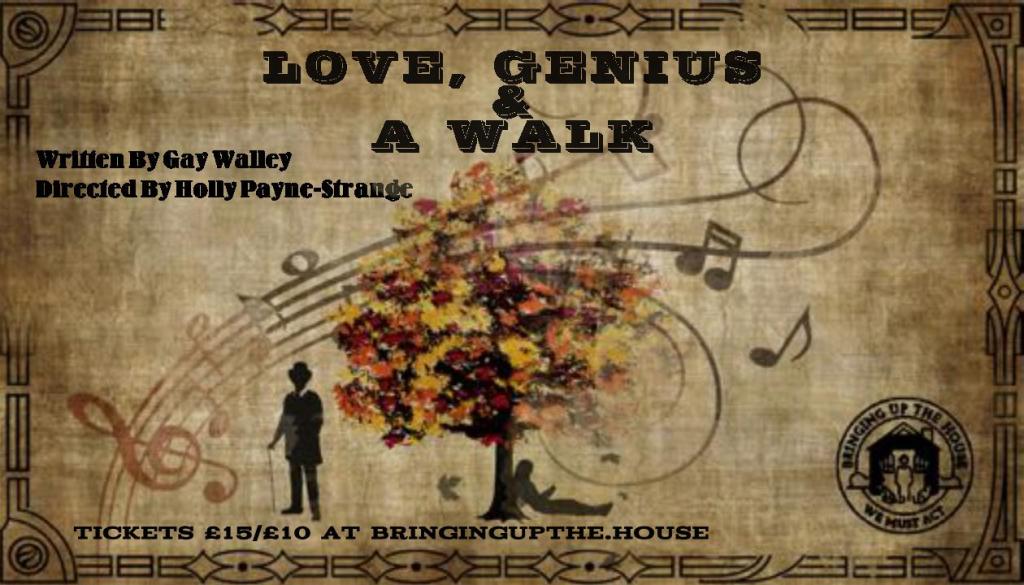Review by Melinda Haunton
There’s a tantalising idea at the heart of this play. What did Sigmund Freud and Gustav Mahler discuss on their only meeting, a walk in Leiden in 1910, fairly shortly before Mahler died? Both were hugely famous, and controversial. Mahler’s marriage was flawed, gossip-worthy, with his frustrated much-younger wife Alma having a fairly public affair with the up and coming architect Walter Gropius. The couple had also lost a beloved daughter some two years before Mahler met Freud. Freud’s theories could hardly be more apposite, or potentially explosive, to this relationship.
Writer Gay Walley has drawn two parallel approaches around this core scene. Freud is still a household name, but Mahler probably less so. Did you know about Gropius’s affair with Alma? I was blissfully unaware until now. So we get a fairly straight set of narrative historical set-pieces, Lloyd Morris a frustrated, emotionally-stifled Mahler, connecting not only with Alma (Chloe Booyens), but a small cast of family and friends, including Richard Strauss. Meanwhile, intercutting, we get a nameless modern Author, obsessed with Mahler, and stuck (willingly?) in her own unsatisfactory marriage with an egotistical financier, who cares nothing for music. This parallel serves to assure us that Mahler’s fame is both merited and challenged in the modern world. It also provides a contrastingly unhappy marriage, reminding us that the Mahler’s’ troubles are scarcely unique. A simple set of desk and couch serves for both past and present, connecting the strands in space.
So far, so well-structured and promising. There are plenty of sharp lines, drawing quick audience laughter or disapproving gasps. The pivotal walk scene is a riot, constantly interrupted by interchangeable groupies of both Mahler and Freud. It is preceded by a neatly intercut dinner party scene, almost Ayckbourn in style, with the modern and Edwardian social concerns and marital blights counterpointing beautifully.
Some of the casting is strong, too, with Morris and Booyens interacting convincingly at cross-purposes. Booyens’ vibrant, irritatingly sympathetic, Alma, would be my great takeaway from the cast, if not for the really excellent performance by debutant Helen Cunningham as the nameless Author. The latter is a difficult part, potentially unmoored from the main thrust of the plot, but Cunningham makes us focus, and care. She deals especially well with some of the more didactic passages put in the Author’s mouth, managing to make them more than lectures. Unfortunately, the didactic tone is what lingers from the play, not helped by a huge cast (of twelve, some of which surely could be doubled, as all the walk-time groupies are by Phoebe Cleghorn, to great effect). The Author’s unsympathetic husband speaks at considerable length, but doesn’t take us further forward; there surely must be a more creative way to demonstrate her own frustrated relationship. We meet her in therapy once, which felt like a neat mirroring of Freud’s role, but we never see that scenario again. The smaller roles are vehicles for plot points, barely characterised, and hard to make sympathetic or interesting in their brief time on the stage.
I saw the play on its first night, the hottest of the year, which is a deeply unfair circumstance to note slight blips in phasing. We were all wilting, and the cast did well to add any snap in the humid atmosphere. They will get slicker. But it’s also true that the play, running at around 95 minutes without an interval, feels lengthier than it should. Some informational dialogue is passably forgivable as introduction to an unfamiliar scenario. What’s less welcome is speech after speech, for multiple characters, providing exposition on the mystery of marriage, the details of theories, the frustrations and glories of genius. These longeurs are made more frustrating, and pointed, by the very real flashes of fun and connection, and the strength of the core idea. There’s potential here that isn’t quite coming out. Could it be cut by 15-20 minutes, and several cast members? I think so. And it would be a stronger piece for it.
Love, Genius and a Walk runs at Ye Olde Rose and Crown until 28 July, and Rosemary Branch Theatre 29-30 July. £10/15: https://bringingupthe.house/lgw-tickets


2 responses to “Love, Genius and a Walk, Bringing Up the House, at Ye Olde Rose and Crown/Rosemary Branch Theatre”
Crikey! We saw different plays. The author was pure melodrama. Freud carried it
LikeLike
[…] a story of second chances. I reviewed Love, Genius and a Walk in its raw state a few months back (https://viewfromthecheapseat.com/2018/07/28/love-genius-and-a-walk-bringing-up-the-house-at-ye-olde-…). There was a kernel of a great story struggling to get out, but it wasn’t there yet, and the […]
LikeLike